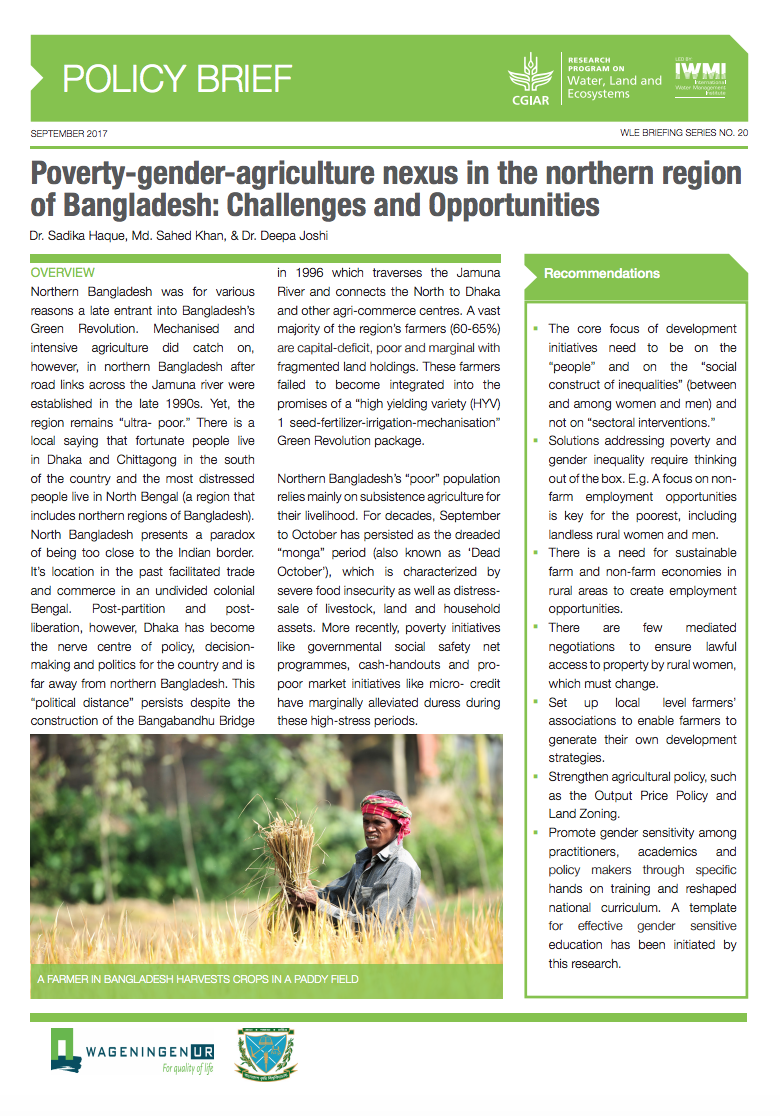Towards sustainable periurban ecosystems
Beyond “More Crop per Drop”: evolving thinking on agricultural water productivity
This Research Report chronicles the evolution of thinking on water productivity in the research agenda of IWMI and in the broader irrigation literature over the past 20 years. It describes the origins of the concept and the methodological developments, its operationalization through applied research, and some lessons learned over the two decades of research.
Smallholder irrigation schemes in the Limpopo Province, South Africa
A survey of 76 public smallholder irrigation schemes in the Limpopo Province was jointly conducted by the International Water Management Institute (IWMI), Department of Agriculture, Forestry and Fisheries (DAFF), South Africa, and the Limpopo Department of Agriculture and Rural Development (LDARD), as part of the ‘Revitalization of Smallholder Irrigation in South Africa’ project.
Pathways from research on improved staple crop germplasm to poverty reduction for smallholder farmers
Innovations to improve staple crop germplasm can reduce poverty and otherwise improve farmer livelihoods through complex and multiple pathways. This paper reviews the evidence for one prominent pathway—through increased incomes (in cash and kind) for poor farmers who adopt the technology.
Beyond “More Crop per Drop”: evolving thinking on agricultural water productivity
This Research Report chronicles the evolution of thinking on water productivity in the research agenda of IWMI and in the broader irrigation literature over the past 20 years. It describes the origins of the concept and the methodological developments, its operationalization through applied research, and some lessons learned over the two decades of research.
Potential Impact of the REDD+ Program on Poverty Reduction in Nghe An Province, Vietnam
Poverty profiles and nutritional outcomes of using spate irrigation in Ethiopia
Development partners and public investors assume that spate irrigation reduces household poverty and malnutrition. This article examines whether the poverty profiles of smallholder farmers and the nutritional outcomes of their children have improved as a result of using spate irrigation. The study areas were in two regional states in Ethiopia. Twenty-five users each, both from traditional and modern spate irrigation schemes, and an equal number of non-users responded to a structured questionnaire.
“Everything We Do Is Democracy”: Women and Youth in Land Rights Social Mobilization in Cambodia
Cambodian human rights organizations estimate that more than half a million people have been affected by land rights issues. Land conflict in Cambodia is a clear manifestation of structural violence affecting communities which are almost exclusively low income and home to indigenous and ethnic minorities. This article explores the complex interplay of actors, particularly women and youth, in land rights social mobilization (LRSM) in Cambodia, focusing on urban Boeung Kak Lake and rural Areng Valley.
In harm's way: Women human rights defenders in Thailand
ABSTRACTED FROM INTRODUCTION: Women Human Rights Defenders (WHRDs) in Thailand make a vital contribution to the advancement of human rights and are in urgent need of recognition and protection. Since the May 2014 coup, they have increasingly become at risk of violence, discrimination, and other violations of their human rights. Women have been systematically excluded from public consultations and decision-making processes, particularly on issues related to land and natural resources.
Livelihood, Land Use and Customary Tenure in KHUPRA: Report of a Participatory Action Research
ABSTRACTED FROM INTRODUCTION: This report is the result of a participatory action research (PAR) conducted by members of Khupra community and Karuna Mission Social Solidarity-Loikaw (KMSS-Loikaw) Livelihood Program team between October 2015 to November 2016. In its first field work, the research team was joined by members of the Indigenous Peoples/Ethnic Nationalities (IP/EN) network who had attended the preparatory training.
Poverty-gender-agriculture nexus in the northern region of Bangladesh: Challenges and Opportunities
Northern Bangladesh is a remote region which was excluded from the Green Revolution and today remains “ultra-poor”. There is a saying in the area that the most fortunate people live in Dhaka and Chittagong in the south of the country and the most distressed people live in North Bengal (Northern regions of Bangladesh). North Bangladesh presents a paradox of being too close to the Indian border, which had facilitated trade and commerce in the undivided colonial Bengal, and too far away from Dhaka, the nerve centre of policy, decision-making and politics in Bangladesh.



